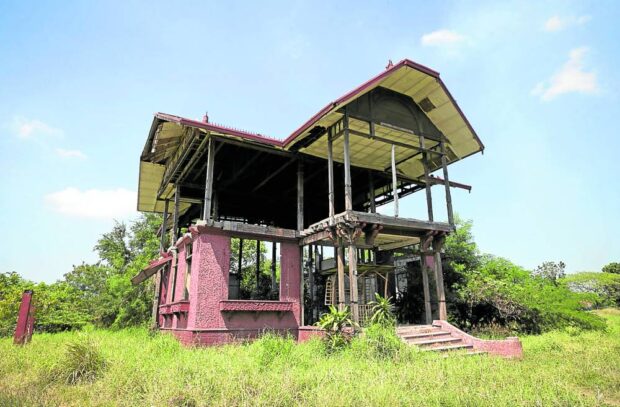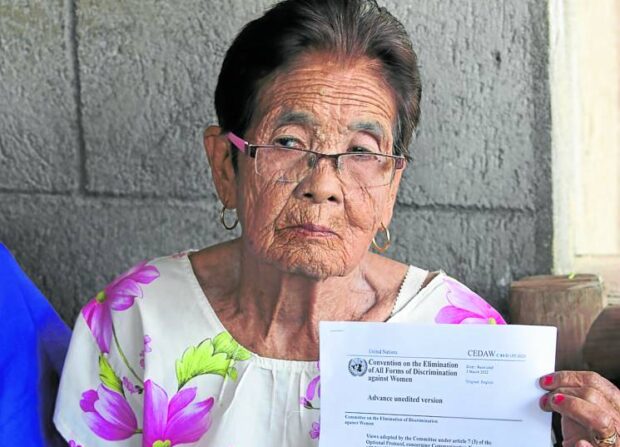‘Comfort women’ rue gov’t silence on their plight

WITNESS TO WARTIME TERROR | The Ilusorio mansion, known as “Bahay na Pula” (red house), in San Ildefonso, Bulacan, is witness to wartime abuses by the Japanese. During World War II, the house was used by Japanese soldiers as one of its camps where Filipino women and girls taken from nearby Candaba, Pampanga, were raped. (File photo by LYN RILLON / Philippine Daily Inquirer)
CANDABA, Pampanga, Philippines — The Malaya Lolas, a group of women who survived Japanese wartime abuses here, have yet to hear from the Philippine government on how it would respond to the request by the United Nations women’s rights committee for compensation and apology for their “continuing discrimination.”
No official or staff from the Department of Justice (DOJ), Philippine Commission on Women, or other government agencies had notified them of the action the government might take since the Committee on the Elimination of Discrimination Against Women (Cedaw) released its decision on March 8 and since Justice Secretary Jesus Crispin Remulla announced his creation of a study group on March 9.
“We have not heard from our government yet. No one has bothered to call us. Really, what will our government do with the UN’s request to help us?” Maria Quilantang Lalu said in Kapampangan when interviewed by phone on Tuesday.
6-month deadline
Lalu, 87, president of Malaya Lolas, said she was not surprised by the “silence” of the government.
“Our own government has been ignoring us since we came out and appealed for help,” she added. In the 19-page decision, the Philippines was directed to submit within six months a written response, including information on any action it has taken, and publish the UN decision.
Lalu, in an interview here on March 19, repeated appeals to President Ferdinand Marcos Jr. to “act fast” to give them justice.
She said she was trying to reach Pampanga Rep. Gloria Macapagal-Arroyo because the former president had been helping them since she was a senator.
Cedaw’s decision reached the Malaya Lolas through lawyer Virginia Lacsa-Suarez, chair of the women’s group Kaisa Ka, following a meeting in Barangay Mapaniqui here on Sunday.
Suarez said her information about the Cedaw findings was obtained from the Center for International Law Manila, the counsel for the previously 24 members of Malaya Lolas.
The 96 women who broke their silence in 1996 are now down to 22. They are either slowed down by old age, bedridden by ailments, or suffering from senility.
The lead complainant in the 2019 cases to the United Nations, Natalia Alonzo, 94, is still alive but confined to bed due to a stroke.
Urgent needs
“Thanks to the Malaya Lolas, justice has been rendered to other Filipinas who came out or who have kept their silence about the sexual violence they suffered at the hands of the Japanese Army during World War II,” Suarez told the Inquirer in a separate interview.
She added: “But in their state now, the Malaya Lolas need urgent financial and medical assistance.”

LIVING TO FIGHT | Maria Quilantang Lalu, 87, president of Malaya Lolas, wants to hear the government’s plan about the plight of her fellow survivors of wartime abuses following a UN decision on the discrimination of Filipino “comfort women.” (Photo by LYN RILLON / Philippine Dailly Inquirer)
According to Suarez, she feared that the United Nations’ favorable decision may end up being a “paper victory.”
In a statement by the UN Office of the High Commissioner for Human Rights, Cedaw “found that the Philippines violated the rights of victims of sexual slavery perpetrated by the Imperial Japanese Army during the Second World War by failing to provide reparation, social support and recognition commensurate with the harm suffered.”
Saying the Philippines had “breached its obligations,” Cedaw requested that the government provide the victims “full reparation, including material compensation and an official apology for the continuing discrimination.”
The cases that Malaya Lolas filed to seek state intervention had been dismissed up to the Supreme Court, leading them to file the complaints before the United Nations.
Remulla had told reporters that the DOJ “will have to talk to Congress, to the Speaker and to the Senate president about the legislation necessary to act on this matter about comfort women kasi hindi tayo nakapag-pass ng legislation. Hindi natapos ’yong trabaho (We were unable to pass legislation. The job was not completed) before, so we have to continue doing the job.”